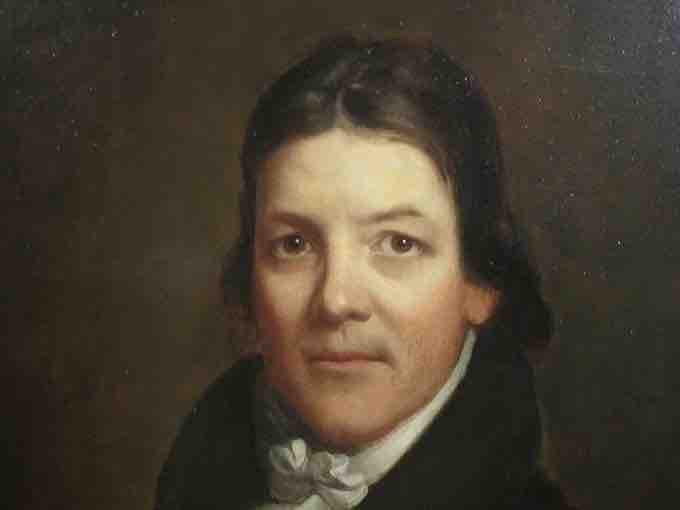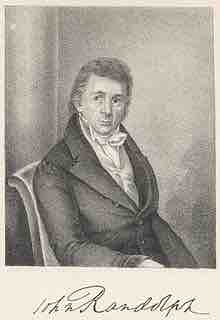Introduction
Virginia congressman John Randolph of Roanoke was the leader of the "Old Republican" faction of Democratic-Republicans that insisted on a strict adherence to the Constitution and opposed any innovations. He summarized Old Republican principles as the following: "love of peace, hatred of offensive war, jealousy of the state governments toward the general government, a dread of standing armies, a loathing of public debts, taxes, and excises; tenderness for the liberty of the citizen; jealousy, Argus-eyed jealousy of the patronage of the President."
John Randolph
John Randolph was a planter and a congressman from Virginia, serving in the House of Representatives and the Senate, and also as minister to Russia throughout his career.

John Randolph
Photograph at the National Portrait Gallery in Washington of John Randolph of Roanoke, VA.
Randolph was committed to republicanism and advocated for a commercial agrarian society throughout his three decades in Congress. His conservative stance, which was well-displayed in his arguments against debt and for the rights of the landed gentry, has been attributed to his ties to his family estate and the elitist values of his home in Southside Virginia. Randolph, who vehemently opposed the War of 1812 and the Missouri Compromise of 1820, was active in debates about tariffs, manufacturing, and currency. With mixed feelings about slavery, he was one of the founders of the American Colonization Society in 1816, which aimed to send free blacks to a colony in Africa. While opposed to the slave trade, Randolph remained dependent on hundreds of slaves to work his tobacco plantation. In his will, he provided for their manumission and resettlement in Ohio.
Followers of Randolph enjoyed both his fiery character and his lively electioneering methods. Randolph appealed directly to yeomen farmers, using entertaining and enlightening oratory, sociability, and a community of interest—particularly in agriculture—that led to an enduring voter attachment to him, regardless of his personal deficiencies. His defense of limited government continued to appeal to modern and contemporary conservatives, most notably Russell Kirk (1918–1994).
The Old Republicans
After serving as President Thomas Jefferson's spokesman in the House, Randolph broke with Jefferson in 1806 and became the leader of the Old Republicans, also known as "quids." This faction of of the Democratic-Republican party was an extreme vanguard of states' rights who wanted to restrict the role of the federal government. The group called for a return to the Principles of 1798 and renounced what it saw as creeping nationalism. Specifically, Randolph promoted the proclamation from the Principles that declared that individual states could judge the constitutionality of central government laws and decrees and could refuse to enforce laws deemed unconstitutional.
Randolph made no effort to build a third party at the federal level. He supported James Monroe against Madison during the run up to the presidential election of 1808 and denounced the Yazoo Purchase compromise of 1804 as totally corrupt. He refused to help fund Jefferson's secret purchase of Florida from Spain. Increasingly, Randolph felt that Jefferson was adopting Federalist policies and betraying the true party spirit.

John Randolph of Roanoke
Autographed portrait of John Randolph.
Other "quid" factions existed in other states, and many had little or no connection at the federal level. The term was first used in 1804, referring to moderates in Pennsylvania and especially a faction of the Democratic-Republican party calling itself "The Society of Constitutional Republicans." Between 1801 and 1806, rival factions of Jeffersonian Republicans in Philadelphia engaged in intense public debate and vigorous political competition that pitted radical democrats against moderates, who defended the traditional rights of the propertied classes. The radicals, led by William Duane, publisher of the Jeffersonian publication the Aurora, pushed for legislative reforms that would increase popular representation and the power of the poor and laboring classes. Moderates successfully outmaneuvered their radical opponents and kept the Pennsylvania legislature friendly to emergent liberal capitalism.
In New York state, the term "quid" was applied to the Democratic-Republican faction that remained loyal to Governor Morgan Lewis after he was repudiated by the Republican majority led by DeWitt Clinton. The New York and Pennsylvania "quid" factions had no connection with one other at the federal level; both supported President Thomas Jefferson.